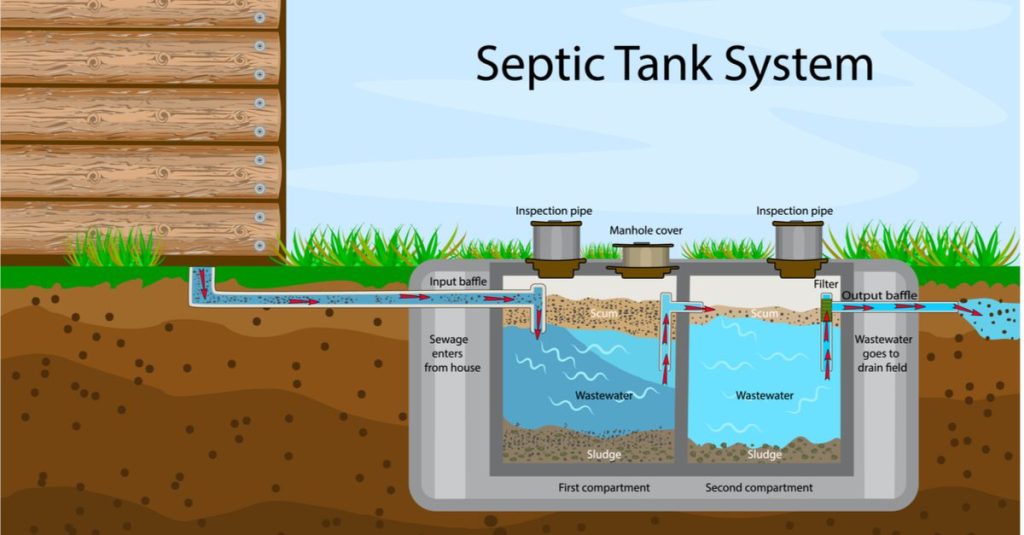A septic tank may not be the most glamorous feature of your home, but it plays a crucial role in managing household wastewater. To ensure the smooth functioning of this underground waste treatment system, homeowners must adhere to the ABCs of septic tank maintenance.
A is for Awareness. Understanding the basics of how a septic tank works is the first step in proper maintenance. Typically buried in the yard, septic tanks receive wastewater from the house and allow solid waste to settle at the bottom while letting liquids flow into the drain field. Being aware of the location, capacity, and age of your septic tank is essential information for effective maintenance.
B stands for Be Mindful of What Goes In. One of the primary responsibilities of homeowners with septic systems is to be cautious about what they dispose of down the drains. Avoid flushing non-biodegradable items like cigarette butts, feminine hygiene products, or paper towels, as these can clog the system. Additionally, be mindful of the substances that go down the kitchen sink, as excessive grease or oil can hamper the tank’s efficiency.

C is for Regular Cleaning and Pumping. Regular maintenance, particularly periodic pumping, is critical for preventing septic tank issues. The frequency of pumping depends on factors such as household size, water usage, and tank size. Typically, professionals recommend pumping every 3-5 years. Regular cleaning helps prevent the accumulation of solids that can lead to blockages and system failures.
D represents Drain Field Care. The drain field, also known as the leach field, is where the liquid effluent from the septic tank is further treated and released into the soil. To maintain its functionality, homeowners should avoid parking heavy vehicles or planting trees with deep roots near the drain field. Compaction and root intrusion can damage the field, leading to costly repairs.
E emphasizes Efficient Water Usage. Excessive water usage can overload a septic system, reducing its effectiveness. Implement water conservation practices by fixing leaks promptly, using high-efficiency appliances, and spreading out laundry and dishwasher usage throughout the week. This helps prevent the system from becoming overwhelmed and ensures a balanced flow of wastewater.
Busy B septic system service maintenance are vital for preserving the functionality and longevity of this essential household component. By being Aware of your system, Being Mindful of what goes in, Regularly Cleaning and Pumping, taking care of the Drain Field, and practicing Efficient Water Usage, homeowners can avoid costly repairs and contribute to the overall health of their septic systems. Regular professional inspections and consultations can further enhance the effectiveness of these ABCs, providing homeowners with peace of mind regarding their septic system’s reliability.
 Furniture and cabinetry play pivotal roles in shaping the character of your kitchen. Opt for sleek, modern designs that not only enhance functionality but also contribute to the overall aesthetic. Matte finishes on cabinetry can lend a contemporary elegance, while the use of open shelving creates a sense of openness and accessibility. Invest in high-quality materials that marry durability with beauty, ensuring that your kitchen stands the test of time. Lighting, often underestimated, is a secret weapon in transforming a kitchen into a stylish retreat on
Furniture and cabinetry play pivotal roles in shaping the character of your kitchen. Opt for sleek, modern designs that not only enhance functionality but also contribute to the overall aesthetic. Matte finishes on cabinetry can lend a contemporary elegance, while the use of open shelving creates a sense of openness and accessibility. Invest in high-quality materials that marry durability with beauty, ensuring that your kitchen stands the test of time. Lighting, often underestimated, is a secret weapon in transforming a kitchen into a stylish retreat on 

 For some of the choices, a metal roof is gorgeous because of its hopeful natural qualities. Metal roofs can truly save assets, and can likewise assist you with saving energy, both in the creation and their utilization. As they are being used, these roofs offer superb protection the properties as in they keep best intensity and the air in the home. It might look counter instinctual, however the truth of the matter is that these roofs are best at reflecting sunlight based heat than the black-top shingled selections of roofs. They come in various color coatings and each coating type has its own sun powered reflectivity. The best coating, with the slant sort of the roof that is considered, it will give the best in energy ability regardless of climate. The benefit of utilizing roofs is that it forestalls green growth, buildup, bother and harmful molds from sticking. It does not empower decay in wet climate or get damaged. It is heat proof and does not consume like black-top shingles or wood,
For some of the choices, a metal roof is gorgeous because of its hopeful natural qualities. Metal roofs can truly save assets, and can likewise assist you with saving energy, both in the creation and their utilization. As they are being used, these roofs offer superb protection the properties as in they keep best intensity and the air in the home. It might look counter instinctual, however the truth of the matter is that these roofs are best at reflecting sunlight based heat than the black-top shingled selections of roofs. They come in various color coatings and each coating type has its own sun powered reflectivity. The best coating, with the slant sort of the roof that is considered, it will give the best in energy ability regardless of climate. The benefit of utilizing roofs is that it forestalls green growth, buildup, bother and harmful molds from sticking. It does not empower decay in wet climate or get damaged. It is heat proof and does not consume like black-top shingles or wood, 